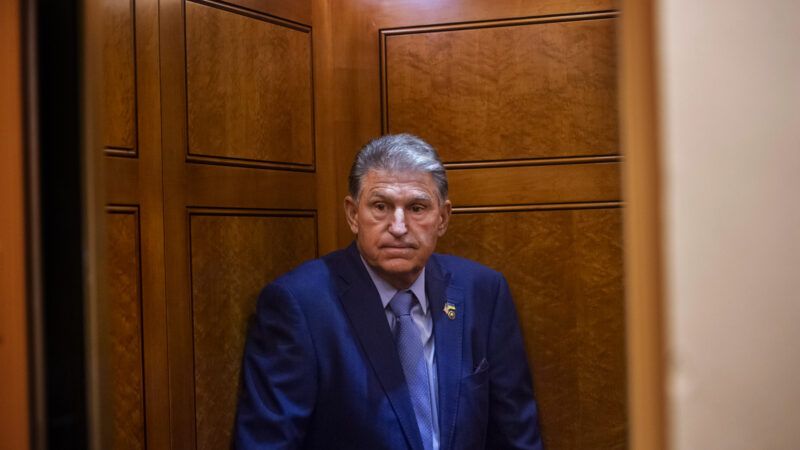Democrats' Rejection of Permit Streamlining Resolution Doesn't Bode Well for Joe Manchin's 'Side Deal'
The West Virginia senator conditioned his support for the Inflation Reduction Act on reforming federal environmental review laws. His Senate colleagues don't seem so hot on the idea.

With yea votes from centrist Sens. Joe Manchin (D–W.V.) and Kyrsten Sinema (D–Ariz.), the U.S. Senate narrowly passed the $740 billion Inflation Reduction Act on Sunday before adjourning for its August recess.
Manchin had conditioned his support for the bill on a "side deal" that would streamline the federal permitting process for new infrastructure projects. But the near-unanimous Democratic rejection of a similar, GOP-backed permit streamlining measure last week suggests that Manchin's co-partisans might not honor that bargain when they return to work in September.
On Thursday afternoon, the Senate voted 50–47 to approve a Congressional Review Act resolution sponsored by Sen. Dan Sullivan (R–Alaska) that would undo the Biden administration's regulatory changes to the National Environmental Policy Act (NEPA). Sullivan's bill would reinstate the more permissive rules adopted in the waning days of the Trump administration.
NEPA is the 50-year-old law that requires federal agencies to examine the environmental impacts of their actions—whether to fund a new road or permit a new power plant—with 600-page or longer studies that take years to complete.
Republicans have long criticized the law for gumming up needed federal sign-offs on both private and public projects. A growing number of Democrats and climate-conscious liberals also see NEPA as an obstacle to building out things like renewable, low-carbon energy infrastructure.
That includes Manchin, who was the only Democrat to vote for the Republicans' resolution. His permit streamlining side deal also proposes a number of fixes and updates to NEPA to speed the environmental review process along. But Democrats in Congress and the White House seem split, expressing commitment to the West Virginia senator's side deal while also defending the Biden administration's tightening of NEPA rules.
During Thursday's Senate floor debate on the CRA resolution, Sen. Tom Carper (D–Del.) said he fought for the modest permitting reforms included in the bipartisan infrastructure that passed last year. But he also described NEPA as a "bedrock environmental protection" and Biden's regulations as a "narrow, targeted change."
Ben Lieberman, a senior fellow at the Competitive Enterprise Institute, argues that the Biden NEPA changes were neither targeted nor narrow. They brought back a requirement that agencies consider direct, indirect, and cumulative effects of projects when reviewing them, which supporters have argued is necessary to account for climate change in NEPA review.
The Trump administration tried to narrow this requirement to only considering effects that have a "reasonably close causal relationship" to the project itself, which Lieberman contends is "what NEPA was all about."
"Whether it's a new pipeline or a new factory or a new hydroelectric facility, you look at the environmental impacts of that facility," he says.
Having passed the Senate, Republicans' CRA resolution now heads to the Democrat-controlled House, which Politico reports is unlikely to pass it. Even if it did, President Joe Biden would almost certainly veto the undoing of his own regulations.
We'll see how Manchin's effort goes. But Democrats' unwillingness to support the streamlining that is actually in front of them doesn't bode well for prospects of NEPA reform.
Rent Free is a weekly newsletter from Christian Britschgi on urbanism and the fight for less regulation, more housing, more property rights, and more freedom in America's cities.
Show Comments (30)